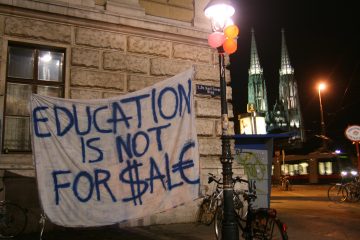The events of 2020 have begun to expose processes previously hidden to most of us. Many are now questioning the status quo. We are being forced to consider how the things we buy are produced: the unsafe working conditions and the environmental destruction which underpin the production of cheap commodities under capitalism. Attractive models, graphics and highly-polished advertising campaigns have long hidden the true horror of fast fashion and the reality of capitalist production: workers across the world are being forced into conditions closely resembling Victorian workhouses to produce cheap clothing, even during a pandemic.
The working conditions of the fast fashion industry have long been well-documented. In 2013 the Dhaka garment factory in Bangladesh which supplies Walmart, Primark, H&M and GAP collapsed killing 1,138 workers. But in the 7 years since little has been done to protect these workers, because doing so would eat into the profits of the factory owners and companies which outsource to them. As a result, 78,842 garment workers at this factory in Bangladesh continue to produce garments in buildings without fire exits. Workers are constantly threatened with termination, forced to work overtime, and denied sick leave. Workers reported working 10 to 14 hour days in heat, without breaks or access to drinking water, which has led to mass fainting episodes. Many are also fired without notice and unable to receive their wages and benefits.
The COVID-19 crisis has also exposed that these conditions are not unique to the global south and not a result of some ‘bad apples’. Following the local lockdown in Leicester many news outlets began to focus on the garment factories in the east of the city and how the working conditions exacerbated the spread of the virus. Labour behind the label, an organisation which campaigns to improve conditions in the clothing industry, claimed workers were being forced to work without adequate safety measures in place including a lack of personal protective equipment (PPE). The bosses of these factories in response to growing demand from sites such as Boohoo and PrettyLittleThing have seen it as an opportunity to line their pockets. The same factory also produces for other more well known retailers such as ASOS, Misguided and New Look. The bosses forced knowingly infected people into work by prohibiting sick pay and access to the government furlough scheme, leaving workers with no choice but to continue working. This really underlies the “freedom” available to us under capitalism is simply the freedom of bosses to exploit labour. Boohoo’s motto loudly proclaims ‘do your thing’: unless you’re a worker wanting sick leave in the middle of a pandemic.
To continue making super profits (Boohoo is estimated to be worth £5bn) these factories disregard existing labour laws. Workers are offered a job for as little as £3.50 an hour – half the minimum wage – to pack clothes. More than three-quarters of garment workers surveyed earned £3 an hour on average.
Similarly, it has been found in a parliamentary report that in Sports Direct’s warehouse in Derbyshire they pay below minimum wage by forcing workers to clock out then continue working. This is on top of their exploitative zero hours contracts leaving them with no sick pay or leave. Not just content with creating profit through underpaying workers, workers are worked to the bone by having orders barked at them through tannoys and stopped from chatting to their co-workers to maximize their productivity. Meanwhile the owner of Sports Direct Mike Ashley is worth just under £3bn. Despite the parliamentary report little has changed at these warehouses; a worker was even forced to give birth in the toilets at the warehouse out of fear that if she missed her shift she would lose her job.
But this mistreatment of workers is part of the reason these companies have been able to compete with clothes manufacturers based in the global south and Eastern Europe. The resurgence of the Black Lives Matter movement has also brought into focus that often the most exploited in the fashion industry are BAME workers who make up the majority of the workforce in Leicster’s garment’s factories. These communities have been cast aside and left to the mercy of the pandemic to continue to produce these clothes. This is the reality of production under capitalism where profits are valued far above the lives of workers.
As Marxists, we understand that such conditions are not unfortunate side effects of capitalism but are essential to capitalism due to its insatiable thirst for ever greater profit. Fundamentally, things under capitalism are produced for exchange not for need. This means in order to continue making profit the ‘efficient’ capitalist system spends millions on advertising and marketing to encourage people to buy more and more clothes they do not need. For example the planet already contains enough clothes to clothe the next six generations. These companies create trends which come in style as quickly as they leave. Marx explained over 100 years ago that the expansion of consumption was and is necessary for the continuation of profit. Production produces consumption, and creates the consumer (the working class) who will then buy it. Therefore, we cannot change the way things are produced by changing our consumption habits alone.
Many of us have vowed not to buy fast fashion or to go vegan repulsed by the horrible conditions in which these commodities are produced. The concealment of capitalist production’s horror is a necessary part of capitalism. By dividing labour to such an extent and protecting ‘business secrets’ they deliberty hide and mystify production so we do not question practices or seek to change it. When we make an order online and it arrives at our door we cannot even begin to consider the exploitation involved in its production: from raw materials, manufacture and delivery. This is not even to mention the environmental impact. This concept is called commodity fetishism. Marx explains that often these commodities can be seen as objects endowed with life seemingly appearing from nowhere with no consideration to the number of people or physical and mental labour involved with producing such items.
The system is global, production is socialised and penetrates all aspects of our lives and production. There is no simple way to ‘opt out’ of capitalism . It needs to be overthrown so we can transform production to be based on need over profit. Labour laws and protections were fought for by the working class and its organisations but are often ignored under the current system. This is because capitalism relies on continued exploitation to sustain itself. When it comes down to it we cannot control production if we do not own it.
If we were to take production into our own hands and only produce on the basis of need we could eliminate cruel practices and environmental destruction which only seek to maximise profit. We can begin to control every aspect of it, from the gathering of raw materials, to manufacture, to distribution and exchange to ensure at all levels workers and the environment are protected.
Therefore to ever have ‘ethical’ consumption we need to organize to consciously overthrow capitalism. But the ruling class of any era has never in history gone down without a fight. It will cling to its source of power- that is its ownership of the means of production for as long as it can even if it means taking humanity and the planet down with it. We must therefore organise ourselves and use the lessons of past struggles to help us to fight for a better world and take the means of production into the hands of the majority. As Marx said, it is not enough to interpret the world; the point is to change it.
Olive Rickson and Esta Norton (Sheffield Marxist Society)




0 Comments